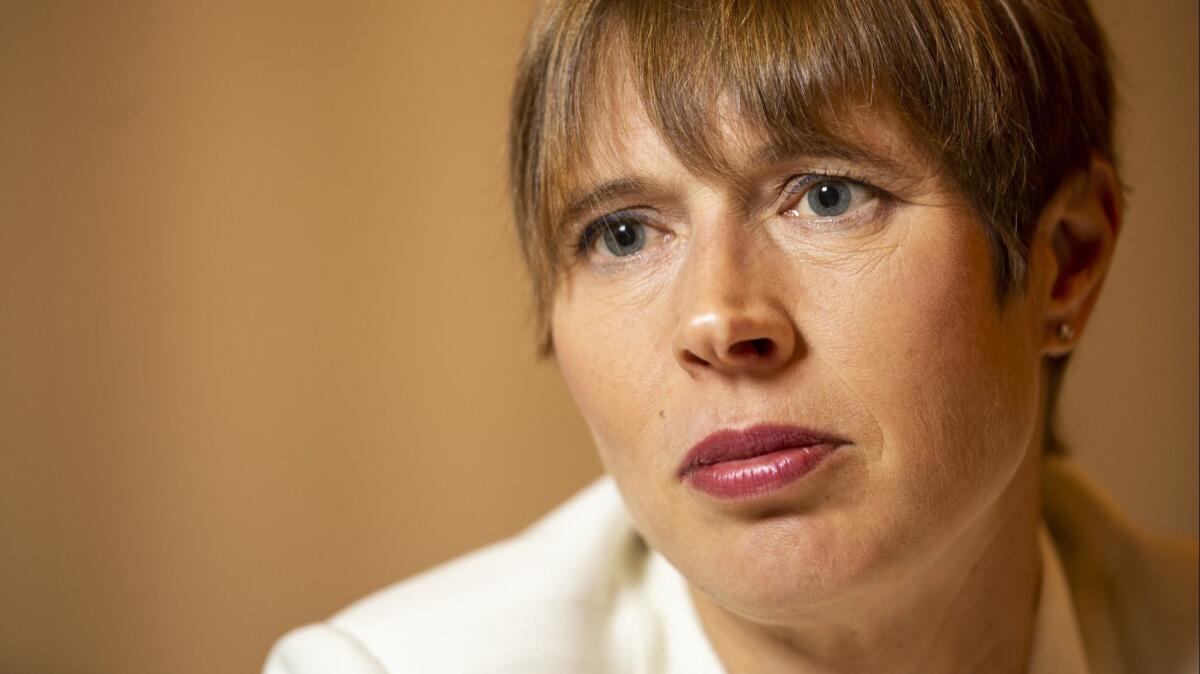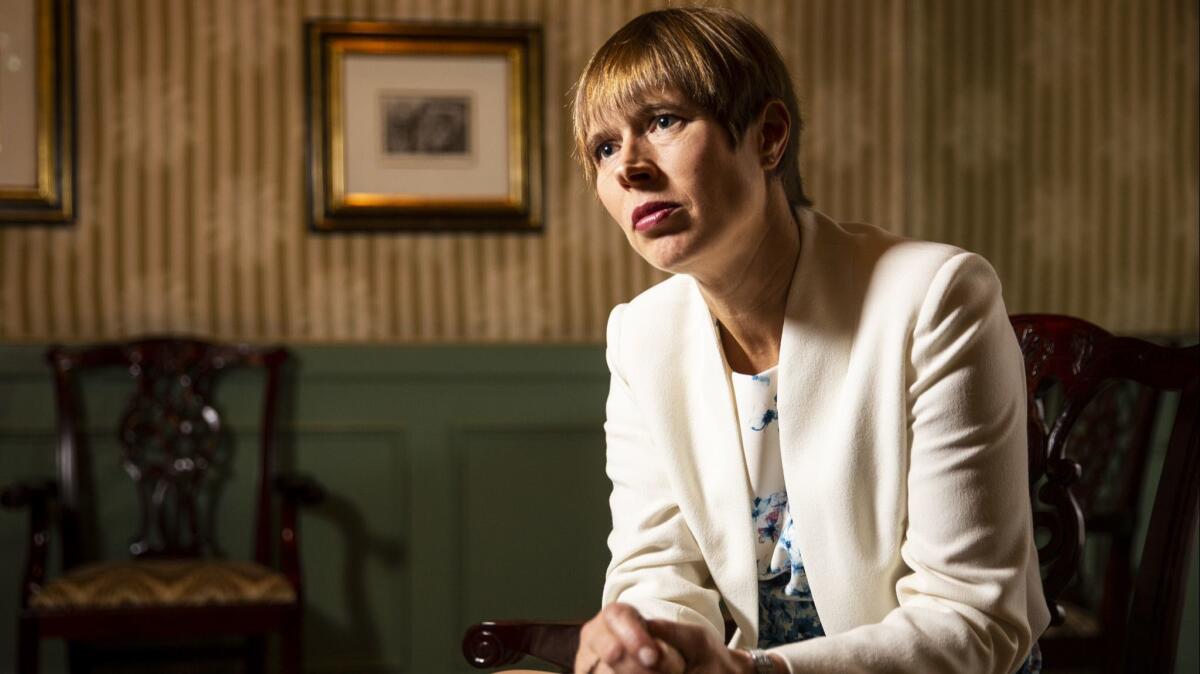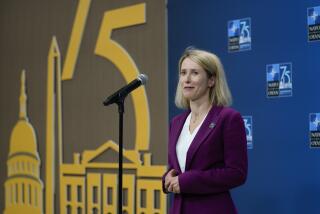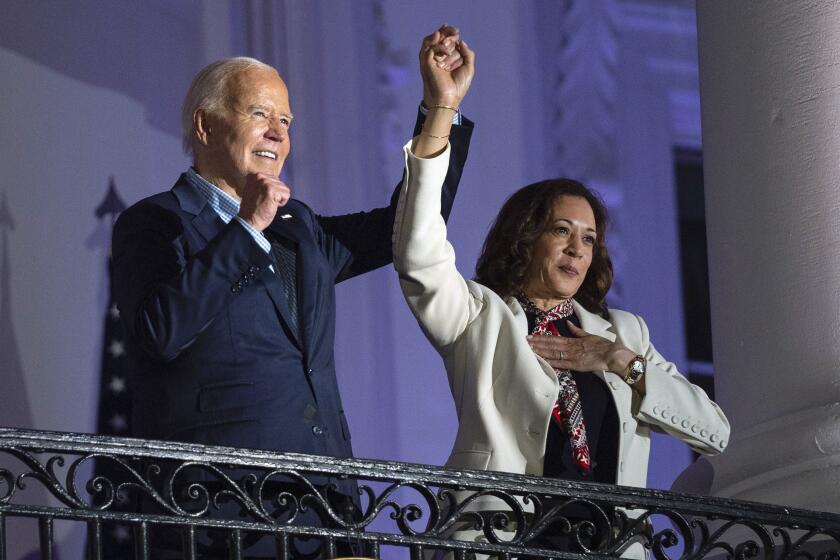It touts itself as the first all-digital nation. Its president talks about internet security, Russia and Donald Trump

Set free by the collapse of the Soviet Union in 1991, tiny Estonia has developed Eastern Europe’s most robust economy, a functional welfare state and — remarkably — perhaps the most digitally advanced government in the world.
Since the turn of the 21st century, Estonia has offered each citizen a government-issued “digital identity” — including a chip-embedded national ID card that can be used for social security, health insurance, voter registration, banking and much more. It also now offers “e-residency” for people around the world who want to be part of its digital revolution, allowing them to register a business in Estonia, which is part of the European Union.
The northernmost of the three Baltic nations, Estonia has one big problem: Its eastern neighbor. Russia, which long dominated Estonia and now deeply resents its membership in NATO, represents an existential threat.

Estonian President Kersti Kaljulaid was in Los Angeles last week, where she discussed her country’s digital initiative and other matters in a speech to the Los Angeles World Affairs Council at the downtown California Club. She later sat down with The Times for a Q&A, which has been edited for length and clarity:
You’ve called Estonia “the first digital society that has its own state.” Can you explain what that means?
Yes. By this I mean, first and foremost, that all Estonian digital developments operate as a single society. We have a single backbone, based on which everybody builds their services. And this applies for the public sector and the private sector equally. Because of course all of us globally use very many online services, digital services, but they come on platforms without any security, simply because you don’t have a digital identity to verify who is doing what to whom on the internet. We do have it, and we’ve had it since the turn of the century, which means we now have one generation which has grown up knowing that the government is at their fingertips. And all the banking services like you have here are at our fingertips as well. But what they also have, as an additional asset, is the security of an internet passport, a digital identity, which makes provision and use of these services safe and secure.
And has this system ever been hacked?
No. I mean, there are numerous tries always, like, I mean, every bank can tell you. In 2007, we were the first country which came under cyberattack, but the result was we were even then able to wall off the Estonian ecosystem. So it worked inside the country, even if it was under strong cyberattack. You couldn’t access it outside; I was in Luxembourg and I couldn’t access it. But inside it was functioning.
Beyond cyberattack, are there risks or concerns about a digital society?
There always are, but we always have concerns also about a paper society. I mean, [in] an analog society, you have risks that somebody looks at your medical data without your acceptance or knowledge. In a digital world, there will be a trace in the system that somebody has been in the system. We also need a clever law space to guarantee the safety of people and also the businesses that offer these services online, and also the government, which also offers the services online. And then you have to be ready to do what you promised. If it says in the law that it’s forbidden and it’s a criminal offense, then you do prosecute those people who come in and look around.
To what extent has Estonia been under cyberthreat from Russia?
No more than anyone else. I mean, there’s no geography in this game. Actually, we saw quite clearly that, during the election period in the U.S. and Europe, the activity of these kinds of actions died down [in Estonia]. We didn’t see that many trolls talking about how horrible [it is to have] German troops east of Germany, for instance. We are quite resilient, because we are ready and prepared all the time to deal with misinformation. So maybe it is easier and better [for Russia] to work somewhere where there are less resilient people.
You’ve spoken about Estonia’s military defenses and said that you’re not afraid of a military attack. What has Estonia done to bolster its defenses against, presumably, a potential Russian attack?
Strong reserve army, first and foremost. Yes, we have our professional army, which is also contributing to security in Iraq and Afghanistan and Africa — many places globally. But you do not defend the country with a small number of well-equipped, well-trained soldiers only. You need a mass mobilization capacity, and this we have. This is what makes us a porcupine. I mean, we are really bad to bite into and there is nothing you will get anyway. Of course we don’t like that there are those kinds of tensions in the region, enhanced tensions. On the other hand, we have deep trust in NATO. I mean, it survived the Cold War, it has a 100% track record in protecting its member states.
Estonia is one of the few NATO members that spends the 2% of GDP that NATO asks. Do you share President’s Trump’s frustration with the other countries that don’t?
Of course we do. But I mean, we don’t only share frustration but we talk with our partners and allies seriously, and we also are looking through European Union mechanisms. Maybe more money can be spent on defense by those countries in Europe whose neighborhood does not merit a big army. Maybe we could redistribute, because the European Union’s single capacity, which NATO doesn’t have, is definitely its ability to redistribute its resources. So we redistribute for economic cohesion, we could easily redistribute for defense cohesion.
You have met once, I believe, with President Trump.
Twice.
Twice?
Yes, once with [the heads of the three Baltic states], and in the White House, but also we had a short chat in Warsaw, where he was in the Three Seas meeting [referring to a group of central and eastern European states].
And you said once that you understood him because of your background in investment banking. Can you explain?
Not only investment banking, but I have an MBA, so I can explain things in cost-benefit terms. I tell my country that we pay about $1 per capita for the United Nations, and for this we get so many children fed, so many migrants helped, so many defense missions out there. With these kinds of simple demonstrations of how much we spend and what we get back, it’s very easy to discuss things. So maybe in my own country I am the same kind of type, who always demands that — tell me, what do I get for it? I think it’s natural that you want to know the cost and benefits.
You are the president of a multi-ethnic, multilingual society that has seen considerable tension between ethnic Estonians and ethnic Russians. Do you worry about the rise of far-right nationalism that we’ve seen elsewhere in the world?
I do worry about this notion that you can solve your problems alone, and that if you don’t like all developments in all multilateral organizations you are a member of, then maybe you should kind of pull back. This I don’t like. I’m always very much about values, and we share the values with our partners and allies in the EU and NATO and also, to a certain extent, the United Nations, because at least we agree to come and discuss — put the elephant on the table, not in the other room.
Domestically, what is Estonia doing to integrate its Russian population with the Estonian?
First of all, the multilingual population is not all Russian. They are from various parts of the Soviet Union. In Narva, the border town between Estonia and Russia, we have 18 different societies of different nations operating. So it’s a really varied group. Second, most of these people really value the European [idea] — the free movements of people, ability to leave the country without any worries about whether you will come back, ability to speak your mind. What do we do to integrate? Of course we need to provide language training, but for me, I find that much more important is, first of all, not to make this error which is constantly made — they always say, you speak Russian, therefore you agree with Putin. It’s so unfair to our Russian speaking population.
The Council of Europe recently issued a report that said Estonia needed to do a better job protecting women from domestic violence and closing the gender gap in pay. Is the government doing that?
It’s interesting. They have always been [concerned] about the gender gap, but domestic violence was only just added, and maybe it’s because of my action. I put into my first speech on our national day, a notion that many people are getting beaten up in their homes, because on holidays this happens more. And this was not an open discussion in our society. All kinds of domestic violence — well, people felt ashamed. The barrier to go and complain to police was high. Estonian police have been wonderful in supporting me in this campaign. You don’t only have after the national holidays the traffic accident information online, you also have how many domestic violence incidents were registered. I see this as one of my big missions.
More to Read
Sign up for Essential California
The most important California stories and recommendations in your inbox every morning.
You may occasionally receive promotional content from the Los Angeles Times.






